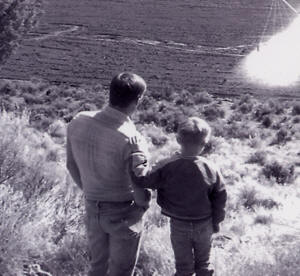
Alan Parks and son, Dan (age 5) at
the ranch
“It takes a rugged personality to live in a pioneer country.”
--Alice M. Parks, June 6, 1945
|
AMERICANA! A slice of life in Oregon
has gone on for four generations at the Poplars Ranch. Farming
and ranching in this vast and arid high desert country began at
the Poplars Ranch in 1926 when Henry and Alice Parks came to the
area. A unique geological landscape, the Parks’ were determined to make a successful life here.
Fort Rock,
Oregon
was discovered long after the many family farms were established
in the rich, lush, fertile river bottom valleys of the
mid-1800s. Henry M. Parks (1872 - 1945), a mining engineer and
his wife, Alice, past dean of women at Iowa State College were
introduced to the Fort Rock
valley around 1920. Just an irrigation water well started it
all. Henry, director of Oregon Bureau of Mines and Geology at
the time, visited the Fort
Rock
basin in 1920 when four test wells were drilled to determine
whether ground water was available for irrigation. Fort
Rock
would become home to the Parks’. In 1923, Henry left the bureau
to devote his life to the Fort Rock Development Company and the
newly established Poplars Ranch. Alice
was happy to know water was available when she arrived to her
new home in the Fort Rock
basin. Named after the many trees Henry and Alice planted at
their homestead nearly one hundred years ago, the Poplars Ranch,
Inc. continues to prosper today.
When Henry was introduced to the Fort Rock
valley by a fellow geologist, they pioneered the idea of
irrigating the area by drilling wells and pumping from the
substantial aquifer they believed was just 50 feet below the
valley floor. His original plan encompassed developing the Fort
Rock property consisting of 17,000 acres of farm land as well as a
hydroelectric project planned for Pringle Falls on the Deschutes River
near La Pine. La Pine is located 50 miles from the Poplars
Ranch. Henry and Alice Parks originally purchased 600 acres
surrounding the #2 test well in Fort Rock
proving that irrigating the dry, sandy region would be
productive. With water abundant from the ground well,
Alice got busy planting lawn, flowers, and poplar and elm trees. This
was considered impossible by area homesteaders at that time, and Alice proved them wrong.
The Great Depression developed hardship for the family, changing
the ambitious land development plans into a struggle to survive.
Plans of the hydroelectric project and dairy industry ideas were
replaced with 3000 laying hens and a small number of beef
cattle. The family sold eggs to logging camps and grocery stores
in
Bend, Oregon,
eighty miles away.
When son of Henry and Alice, Merritt
“Bud” Parks
(1912-2004) announced to his parents he was to be married to
Helen Barrow of Iowa in 1945, his mother,
Alice, wrote a heartfelt letter to Miss Barrow. Alice’s words describe
life in Fort Rock
well, “It is a country you will either love or hate, so it is
probably better to find out first how it affects you. I love
this country myself, better than any place I’ve ever lived. I
think the thing I like best about it, is the creative
possibility it has. We came out here when there was nothing but
sagebrush all around us. Not even a house, only a wonderful
irrigation well. Out of that desert land we have carved a very
productive ranch and a cattle range. The contrast is quite
remarkable. I think we all have a certain amount of creative
instinct and love to make something out of nothing. It might
only be taking a useless garment and fashioning it into a
stylish and good looking dress, or taking a child and guiding
and helping him to become a fine useful person, or a piece of
barren land and creating home. A person feels he is working hand
in hand with God.”
Bud and Helen Parks followed the tradition of farming in the
challenging, non-mild Fort Rock
valley. Bud was instrumental in getting electricity to the area
in 1955. Bud and Helen’s sons, Alan and Bill helped on the ranch
as youngsters. Alan, after marrying wife, Laura, took over
management of the ranch when he, his wife and children, Dan and
Allison returned from his career in Portland in 1981. Developing more irrigated land, improving the quality,
quantity and the marketing of the hay, Alan and Laura still,
today, manage the daily operation of the ranch along with son,
Dan. “It’s a place and lifestyle you can’t leave. This ambition
of ranching is in my blood. I wouldn’t change careers for
anything else, I love it!,” says Alan Parks. “Dan’s
knowledge and the ability to improve the management and genetic
selection in the cow herd, has contributed to the present and
future of our success.”
A descriptive woman, Alice Parks, said it all in her early
writing. Today, in the center of the alfalfa hay capitol of the
Western states, the Poplars Ranch produces some of the best
alfalfa and grain hay in the entire western (region). Also,
noted for their registered Hereford cattle, the Poplars Ranch continues
to produce award winning bulls. A product of Americana, homestead America
on the Poplars Ranch!
We invite you to visit our ranch. It is our desire to give you
an inside look at our productive Hereford bulls for sale, and the quality of hay inventory. Please write
or give us a call to schedule a tour.
|


